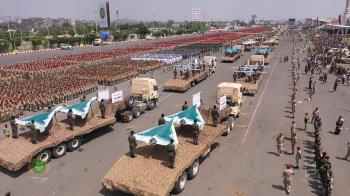Alwaght- Senior United Nations human rights officials have expressed their alarm at the rise in violent rhetoric by influential religious leaders – including calls for “holy war” against certain faiths – in relation to the situation in Syria.
The UN Secretary-General’s Special Adviser on the Prevention of Genocide, Adama Dieng, and Special Adviser on the Responsibility to Protect, Jennifer Welsh, condemned the recent call by clerics in Saudi Arabia for Sunni Muslims and their States to support a “holy war” against Shiite Muslims and Christians in Syria, as well as against States and non-State armed groups perceived to support them.
“Such rhetoric can aggravate the already extremely volatile situation in Syria by drawing religiously motivated fighters to join all parties to the conflict, thus escalating the risk of violence against religious communities,” said the Advisers in a statement, adding that “advocacy of religious hatred to incite or justify violence is not only morally wrong, but also prohibited under international law.”
Mr. Dieng and Ms. Welsh also expressed concern at reports that Russian Orthodox clerics had referred to the Russian participation in the conflict in Syria as a “holy battle” against terrorism, as “statements of this kind can be manipulated, feed suspicion and increase polarization of communities.”
The Special Advisers also noted the response by Russian authorities, who reportedly denied that there was any religious connotation to their involvement in Syria.
They praised the organization Syrian Christians for Peace for rejecting the concept of a Christian “holy war” and condemning those who invoke it.
The foreign-sponsored conflict in Syria, which flared up in March 2011, has reportedly claimed more than 240,000 lives up until now.
The Syrian government has repeatedly called on countries supporting and funding the terrorists operating in the country, particularly Western countries led by the US and its regional allies including the Israeli regime, Saudi Arabia, Qatar, and Turkey, to stop their hostile practice.
- Why’s Donetsk Significant for Putin?
- Why’s Situation Still Combustible despite Pakistan-Afghanistsn Peace Agreement?
- Yemen, the Champion of Gaza War and Peace
- Resolution 2231 Expires: Fresh Breath for Iran in a Multipolar Space
- Hezbollah’s Sheikh Qassem Pays Tribute to Martyred Yemeni Commander al-Ghamari
- Mossad Agent Executed in Qom, Iran
- Iran and Azerbaijan Conduct Joint Naval Exercise in the Caspian Sea
- Al-Qassam Reaffirms Commitment to Ceasefire, Denies Involvement in Rafah Attacks
- Israel Allegedly Breached the Gaza Truce 47 Times, Killing 38 Palestinians
- Dream for China, Nightmare for US: Yuan Drift Toward Internationalization
Editor's Choice

Yemen, the Champion of Gaza War and Peace Through missile strikes and Red Sea ban, Yemen’s Ansarullah has been key to pressuring Tel Aviv to accept a ceasefire deal with Hamas.
Prisoners’ Bodies: Netanyahu’s New Excuse for War Netanyahu is obviously seeking a new pretext to resume war on Gaza while Hamas says it delivered all bodies of prisoners it held.
Gaza War and Post-war Costs for American Taxpayers The US unwaveringly backed Israel’s devastating and genocidal campaign in Gaza and spending to continue after ceasefire.
Israeli Economy Caught between War and Isolation Impacts The Israeli economy is counting the costs of war and the government is increasingly directing its resources to keep the war machine running.
Short and Long-term Implications of Israeli-Iranian War: What Do Western Think Tanks Say? The western think tanks cannot hide dangers to Israel in a future war, they advise continued American military cooperation with Tel Aviv.
News

Hezbollah’s Sheikh Qassem Pays Tribute to Martyred Yemeni Commander al-Ghamari
Hezbollah Secretary-General Naim Qassem expressed condolences to Sayyed Abdul-Malik al-HouthiMossad Agent Executed in Qom, Iran Seyyed Kazem Mousavi, head of Qom’s Judiciary, announced on Sunday that a Mossad spy had been executed
Iran and Azerbaijan Conduct Joint Naval Exercise in the Caspian Sea Iranian and Azerbaijani naval forces conducted a joint maritime rescue and relief drill near Boyuk Zira Island off Baku’s coast in the Caspian Sea
Al-Qassam Reaffirms Commitment to Ceasefire, Denies Involvement in Rafah Attacks The Al-Qassam Brigades reiterated their commitment to the Gaza ceasefire, denying any involvement or awareness of the Rafah operations
Israel Allegedly Breached the Gaza Truce 47 Times, Killing 38 Palestinians Gaza’s Government Media Office reports that since the October 10 truce began, Israel has violated the ceasefire with Hamas 47 times
Tehran, Moscow, Beijing Notify UN of Resolution 2231’s Termination Iran, Russia, and China have jointly informed the UN Secretary-General and Security Council President of the termination of Resolution 2231
Top Iranian Military Official: Threats Cannot Weaken Iran’s Sovereignty A high-ranking commander of the Iranian Army affirmed that the security and sovereignty of the Islamic Republic cannot be undermined
Iranian Naval Chief Says Adversaries Seeking to Exclude Iran from Regional Waterways Adversarial states are implementing strategies designed to constrain global maritime corridors and marginalize Iran’s participation in them
Iran Rejects Revival of Expired UN Resolutions as Illegitimate and Baseless Iranian Foreign Minister Abbas Araghchi has condemned efforts by the three European signatories to the 2015 nuclear deal
Report Warns Gaza Faces Environmental Collapse After the War Gaza is on the brink of environmental collapse after two years of war
Iran FM Says Reinstating Lifted UNSC Resolutions Has No Legal Basis Iranian FM Araghchi warns that attempts to reinstate lifted UNSC resolutions against Iran lack any legal basis
President Reiterates Iran’s Commitment to Global Economic Collaboration President Masoud Pezeshkian underscored his government’s determination to strengthen international economic ties
Iran, Russia Planning Construction of Eight Nuclear Power Plants, Official Says According to Iran’s nuclear chief, the agenda includes the construction of eight nuclear power plants in the southern provinces of Bushehr and Hormozgan
Italian Police Confront Pro-Palestinian Demonstrators Ahead of Israel Football Match Police clashed with pro-Palestinian demonstrators in the northern Italian city of Udine ahead of Italy’s 2026 World Cup qualifier against Israel
Hamas Blames Israel for Blocking Search for Captive Bodies as Gaza Suffers Under Siege According to a senior Hamas official, Israel is impeding attempts to find and repatriate captive bodies in Gaza
Secret Base ‘Site 81’ Exposed After Iranian Strike on Tel Aviv Tower Investigation exposes Israel’s hidden US military bunker beneath a Tel Aviv apartment building, highlighting risks of using urban areas for military operations
Iranian FM: Trump Cannot Advocate Peace While Supporting War Criminals Iranian FM Abbas Araghchi warned Trump that no leader can claim to be a “President of Peace” while fueling wars and siding with war criminals
Army Chief Says Iran Has Adopted New Measures to Address Security Threats Major General Amir Hatami, Commander of the Iranian Army, announced that Iran has developed new defense and deterrence strategies
Six More Palestinians Killed in Gaza; Hamas Accuses Israel of Ceasefire Breach In less than 24 hours, Israeli forces have killed at least six Palestinians throughout the Gaza Strip
Survivors of Israeli Prisons Speak Out: ‘We Were in a Slaughterhouse’ Palestinians freed under the Gaza ceasefire deal have shared disturbing testimonies of systematic abuse, describing Israeli prisons as slaughterhouses
Most Viewed
Resolution 2231 Expires: Fresh Breath for Iran in a Multipolar Space
Why’s Situation Still Combustible despite Pakistan-Afghanistsn Peace Agreement?
Iran and Azerbaijan Conduct Joint Naval Exercise in the Caspian Sea
Yemen, the Champion of Gaza War and Peace
Mossad Agent Executed in Qom, Iran
Al-Qassam Reaffirms Commitment to Ceasefire, Denies Involvement in Rafah Attacks
Israel Allegedly Breached the Gaza Truce 47 Times, Killing 38 Palestinians
Hezbollah’s Sheikh Qassem Pays Tribute to Martyred Yemeni Commander al-Ghamari
Why’s Donetsk Significant for Putin?
Iran FM Says Reinstating Lifted UNSC Resolutions Has No Legal Basis
Six More Palestinians Killed in Gaza; Hamas Accuses Israel of Ceasefire Breach
2K Palestinians Released from Detention Amid Widespread Celebrations
Iran, Russia Planning Construction of Eight Nuclear Power Plants, Official Says
Tehran Reacts to Message Delivered to Iran by Putin on Behalf of Israel
Israel in Grief, Gaza Celebrating: How’s First Day of Ceasefire Gone?
Figures on Palestinians Hamas Freed during Two-year War: Epic Stories of Four Prisoners
Iran-Russia Defense Ties Align with International Law
Army Chief Says Iran Has Adopted New Measures to Address Security Threats
Gaza Reconstruction Promises: From Sharm El-Sheikh Summit to Field Challenges
Chilling Accounts from Israeli Prisons: From Torture to Human Organ Theft
Iran Warns Regional Security at Risk Amid Afghanistan-Pakistan Border Tensions
Iran Rejects Revival of Expired UN Resolutions as Illegitimate and Baseless
What’s behind Al-Sharaa’s Moscow Visit?
Tehran, Moscow, Beijing Notify UN of Resolution 2231’s Termination
What’s the Message of Turkish-Egyptian Military Drills?
Short and Long-term Implications of Israeli-Iranian War: What Do Western Think Tanks Say?
New Color Revolution? West’s Hands in Georgia Protests
Three Years of Fighting: Why’s Sudan not Settling?
European Recognition of Palestinian State a Political Show: Analyst
As Pro-Israeli Board Acquires TikTok, Palestinian Voice Censorship Concerns Rise
Government Shutdown in US As Trump Threatens Mass Dismissals of Federal Workers
Jolani’s Journey to the US: Wanted Terrorist Now Speaks at the UN
EU3 Cautioned Against Missteps on Iran’s Nuclear Issue
Thousands Gather in Luxembourg to Protest Israeli Atrocities in Gaza
Approximately 233,000 Palestinians Reported Dead or Injured Amid Israeli Strikes in Gaza
Parliament Motion on Iran Leaving NPT Finalized, Awaits Vote
Death Toll Rises as Israeli Forces Kill 22 Palestinians, Including Children, in Gaza
Iran, Russia Plan Agreements to Develop New Nuclear Power Plants
Top Iranian General Hails Naval Forces’ State of Full Preparedness for Confrontation
In Focus

Ansarullah
A Zaidi Shiite movement operating in Yemen. It seeks to establish a democratic government in Yemen.
Shiite
represents the second largest denomination of Islam. Shiites believe Ali (peace be upon him) to be prophet"s successor in the Caliphate.
Resistance
Axis of Resistances refers to countries and movements with common political goal, i.e., resisting against Zionist regime, America and other western powers. Iran, Syria, Hezbollah in Lebanon, and Hamas in Palestine are considered as the Axis of Resistance.
Persian Gulf Cooperation Council
A regional political u n i o n consisting of Arab states of the Persian Gulf, except for Iraq.
Taliban
Taliban is a Sunni fundamentalist movement in Afghanistan. It was founded by Mohammed Omar in 1994.
Wahhabism & Extremism
Wahhabism is an extremist pseudo-Sunni movement, which labels non-Wahhabi Muslims as apostates thus paving the way for their bloodshed.
Kurds
Kurds are an ethnic group in the Middle East, mostly inhabiting a region, which spans adjacent parts of Iran, Iraq, Syria, and Turkey. They are an Iranian people and speak the Kurdish languages, which form a subgroup of the Northwestern Iranian branch of Iranian languages.
NATO
The North Atlantic Treaty Organization is an intergovernmental military alliance based on the North Atlantic Treaty which was signed on 4 April 1949.
Islamic Awakening
Refers to a revival of the Islam throughout the world, that began in 1979 by Iranian Revolution that established an Islamic republic.
Al-Qaeda
A militant Sunni organization founded by Osama bin Laden at some point between 1988 and 1989
New node













